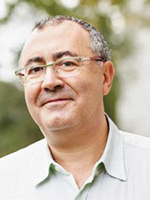Dr. Jean-Pierre Routy
The Immune System and the Cure for HIV
McGill University and Royal Victoria Hospital, Montréal
 HIV/AIDS was an little known disease when Dr. Jean-Pierre Routy was in his residency at Centre Hospitalier Général d'Aix-en-Provence in 1982. "Within 15 days of starting my residency, I got a call about a young patient, he was 26 years old, had seizures, a brain lymphoma and atypical tuberculosis. I was facing a mystery," says Dr. Routy. He couldn't help but feel a kinship with this young man. As the world became aware of AIDS, Dr. Routy knew that this patient was likely suffering from this disease. But at the time, little could be done and the patient died soon after. This patient and that moment in time oriented Dr. Routy's career towards HIV research and treatment.
HIV/AIDS was an little known disease when Dr. Jean-Pierre Routy was in his residency at Centre Hospitalier Général d'Aix-en-Provence in 1982. "Within 15 days of starting my residency, I got a call about a young patient, he was 26 years old, had seizures, a brain lymphoma and atypical tuberculosis. I was facing a mystery," says Dr. Routy. He couldn't help but feel a kinship with this young man. As the world became aware of AIDS, Dr. Routy knew that this patient was likely suffering from this disease. But at the time, little could be done and the patient died soon after. This patient and that moment in time oriented Dr. Routy's career towards HIV research and treatment.
Today, Dr. Routy's work focuses on immune-based therapies and therapeutic vaccines that modify or enhance the role of the patient's immune system in fighting HIV infection. "The body wants to protect itself and creates an anti-inflammatory response to control organ damage induced by the virus, but in the absence of a cure, the system continues and the fight back may be worse than the invader," explains Dr. Routy. "Immune-based therapies represent a new era in HIV treatment."
Supported by the CIHR HIV/AIDS Research Initiative as part of a team of researchers across Canada, Dr. Routy recently explored the use of Interleukin-7 (IL-7), a cytokine that promotes T-cell growth. The team of researchers looked at IL-7 in the context of gut mucosa, a permeable surface that becomes increasingly so during HIV infection. This 'leaky gut' allows microbes to leak through the mucosa which in turn causes chronic immune activation in the body. The clinical study of HIV+ patients showed that treatment with IL-7 increased CD4+ cell expansion in the blood and decreased inflammation in the gut. It was also able to partially repair the gut by increasing the number of CD4+ T cells.
Of course, research into this new line of treatment is not without its challenges and negative results are part of progress. Dr. Routy and his colleagues recently published a paper on the use of chloroquine for promoting CD4+ T cell recovery by reducing inflammation. Chloroquine is used in other autoimmune disorders and would be an ideal medication because of its low cost and good safety profile. But, the results have been negative, showing no change in CD4+ T-cell recovery in clinical trials. "It's a bit disappointing," Dr. Routy admits, "but at least we've answered the question.
As part of the Canadian HIV Cure Enterprise Team (CanCURE) supported by CIHR, CANFAR and the International AIDS Society, Dr. Routy's research continues to venture into novel treatment strategies. He hopes these new treatments will help to eliminate HIV from the body by making the virus more visible to the immune system. In this new era of HIV therapeutics, "We have to think differently," says Dr. Routy.
The Canadian Association for HIV Research (CAHR), the CIHR HIV/AIDS Research Initiative, the Canadian Foundation for AIDS Research (CANFAR), the CIHR Canadian HIV Trials Network (CTN) and the Canadian HIV Vaccine Initiative (CHVI) Research and Development Alliance Coordinating Office (ACO) would like to thank Dr. Routy and his colleagues for their significant contributions to our understanding of HIV. Their work is part of a larger Canadian research effort that is making a difference in the lives of those affected by HIV in Canada and around the world.
- Date modified: